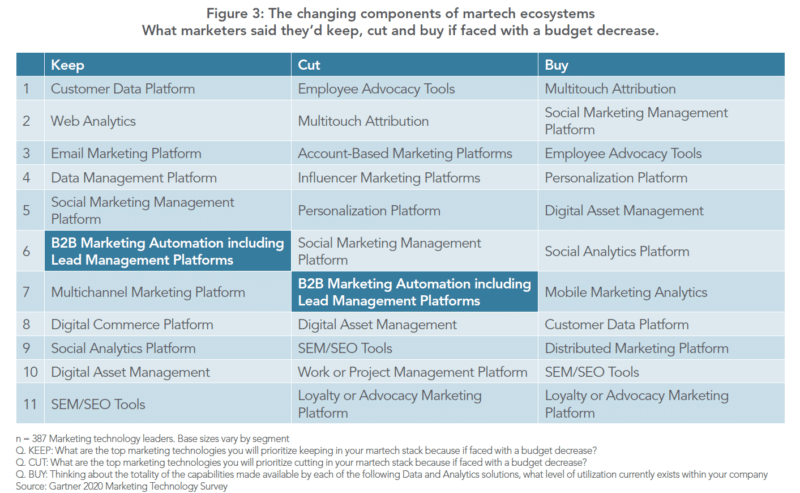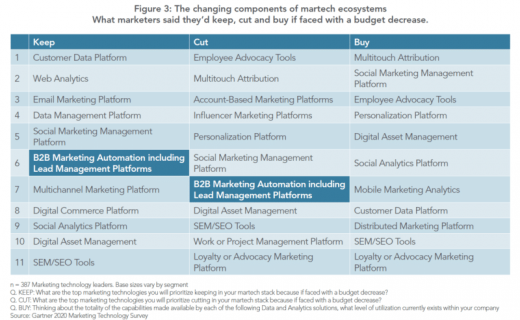B2B marketers rely on marketing automation: Tuesday’s daily brief
Plus the privacy wars and fake e-commerce listings
Marketing Land’s daily brief features daily insights, news, tips, and essential bits of wisdom for today’s digital marketer. If you would like to read this before the rest of the internet does, sign up here to get it delivered to your inbox daily.
Good morning, Marketers, and are you ready for three-dimensional warfare?
The gloves are off between Apple and Facebook. With the implementation of new App Tracking Transparency policies, Apple has created a situation in which Facebook can only track user activity across multiple apps if the user goes out of his or her way to opt in to being surreptitiously surveilled.
With over 80% of users accessing Facebook via mobile phone, this could massively degrade Facebook’s ability to target by interest and behavior, and thereby degrade the value of its ad inventory. According to the New York Times, Mark Zuckerberg has disputed that his company’s business will be hurt by Apple’s policy — but then Zuckerberg has said quite a few strange things over the years.
Meanwhile, of course, as Google seeks to become its own walled garden in competition with Facebook, its FLoC solution has been criticized by privacy advocates, blocked by Microsoft Edge, and faces the possibility of a default block by WordPress (which powers about 41% of the world’s websites) — there are already WordPress plug-ins individual sites can use to block FLoC.
On second thoughts, let’s say multi-dimensional warfare: the kind of disruption which creates great uncertainty for marketers and publishers.
Kim Davis
Editorial Director
How Smartly.io is overcompensating for its carbon emissions
Climate and the environment were topics Smartly.io, the social advertising platform, had felt strongly about for some time, but it was the changes wrought by the pandemic that spurred the Smartly team into action. “The events of last year provided a new sense of awareness of the impact of some of our activities as a business would be affecting the environment, or the world in general,” said Robert Rothschild, Smartly’s CMO, VP and global head of marketing.
Smartly decided to partner with Compensate, a nonprofit that helps companies measure, reduce and offset carbon emissions. “We had an opportunity to leverage their expertise, their ability to manage the calculation of the carbon footprint in the most scientifically accurate and efficient way,” Rothschild said.
Compensate charges fees for its service, but channels that revenue into support for both traditional and innovative carbon capture projects — the removal of CO2 from the atmosphere. Compensate clients like Smartly can “overcompensate” by supporting the eradication of more CO2 than their own activities create. “In our case, we actually purchased and retired more than 10,000 carbon credits,” said Rothschild, “which enabled the removal of over 6,000 tons of CO2 from the atmosphere.”
The largest source of Smartly’s carbon footprint turned out to be business travel. The plan is to reduce those emissions by considering what volume of travel is urgent and necessary, and looking at alternatives to air travel.
Why we care. We might not consider the martech and adtech industries to be big contributors to carbon emissions — unless, that is, we count the reliance any cloud-based business has on server farms — but Smartly.io’s initiative is a reminder that any company has it in its power to reduce (or compensate for) its carbon footprint.
Martech stacks vary considerably, but B2B marketers rely on marketing automation

When it comes to the technologies marketers say they would most likely cut, keep or buy if faced with a budget decrease, interestingly B2B marketing automation showed up in both the “keep” and the “cut” columns, as some respondents found them essential and others thought they could do without them. Gartner Senior Director Analyst Colin Reid, who delivered the insight at the company’s latest Marketing Symposium/Xpo, noted that this split was largely along B2B versus B2C lines, with companies focused largely on B2B putting the technology in the “keep” column.
Analysts also highlighted the martech practices of high-performing brands, noting that: “No single technology product, save web analytics and digital marketing tag management, was adopted by 100% of Genius and Gifted brands. Instead, brands with high digital intelligence and complex martech stacks combine some of the core marketing technologies for analytics, data management, advertising, personalization and multichannel marketing.”
Tracking down fake e-commerce listings
One in five fake e-commerce listings came from just 3% of repeat offenders, a new study from brand protection company Incopro found. Eliminating this cohort of illicit sellers couldn’t prevent up to $78 billion in annual losses for brands.
The study resulted from statistical analysis of 1.5 million IP enforcements across over 750 brands. They looked at 34 platforms, including popular marketplaces and social sites, and determined that a strictly enforced “three strikes” policy on offending fake posters would protect brands and consumers alike.
Incopro makes two baseline recommendations for e-commerce marketplaces:
(1) all seller identities should be verified; and
(2) all sellers should be removed from the marketplace or social site if identified as selling illicit goods and services on more than three occasions (“three strikes”).
Currently, according to Incopro, 68% of the selling platforms they surveyed have some policy in place to root out repeat offenders. Only three of the platforms (Alibaba, Aliexpress and Taobao) go as far as banning the illicit sellers.
Why we care. Why wouldn’t e-commerce marketplaces and social platforms want to build trust between sellers and consumers? As big brands focus more of their strategies on social commerce, they have to be assured that the environment is safe for their brand and not wasteful to their bottom line.
Google Ads announces steps for smooth transition as Apple’s ATT goes live
With Apple’s App Tracking Transparency policies going live (May 01, 2021), iOS users will now be prompted to accept or decline sharing data across apps. Because of these changes, Google is updating the way they report and measure conversion information for ads service on iOS14.
Here are some of the details for advertisers promoting web-based conversion goals:
- Google is no longer sending the Google click identifier (GCLID) for iOS 14 traffic coming from ads on a handful of Google apps. As such, you may see a decrease in reported website conversions.
- Advertisers running Display, Video and other campaigns promoting web-based conversion goals may see performance fluctuations as Apple’s ATT policies go into effect and as Google expands modeled conversions to more iOS 14 traffic.
The support piece by Christophe Combette, Group Product Manager, Google Ads also dives into how advertisers that are promoting iOS apps may see changes as well.
Quote of the day
On Apple’s App Tracking Transparency policy: “This is a huge step in the right direction, if only because it’s making Facebook sweat,” Gennie Gebhart, Associate Director of Research, Electronic Frontier Foundation
Marketing Land – Internet Marketing News, Strategies & Tips
(20)



